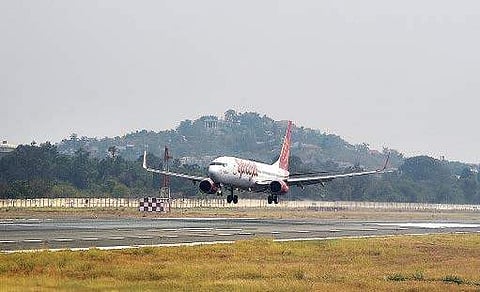

CHENNAI: Will the carbon reduction plan mooted by International Air Transport Association (IATA) strangle the Indian aviation sector? As the association is marking the first anniversary of the historic global agreement, Carbon Offsetting and Reduction Scheme for International Aviation (CORSIA), the aviation industry here is cautious on signing the treaty, which, while aiming to curb emissions, could have a serious impact on the sector that is waiting at the cusp of a revolution.
The agreement, signed at the 39th Assembly of the International Civil Aviation Organisation (ICAO), is an initiative to reduce carbon footprint by airlines. Under this, the average level of carbon dioxide emissions and international aviation covered between 2019 and 2020 will be taken as the base carbon neutral growth figure, against which emissions will in future be compared. It is this base year that the aviation insiders have concerns.
Consider this: In 2016, India had 100 million domestic passengers and became the third biggest market in terms of domestic passenger volume (Source: Capa Centre of Aviation, Sydney). But these figures are deceptive. Japan, which was pushed to fourth in this ranking, had 97 million passengers for a population of 127 million, while only 100 million (less than eight per cent) of Indians flew out of nearly 130 crore population. For another comparison, Heathrow airport, London, alone, had 70 million domestic passengers in 2015 (Source: Eurostat, the statistical office of EU).
The aviation sector, though in operation for decades, is still nascent in terms of potential, and the growth is expected to quicken after the Centre came out with the policy to encourage connectivity to smaller hubs under Udan scheme. According to IATA’s own estimates, air passenger traffic in India is expected to grow to 442 million by 2035 (Source: IATA global report).
Thus, the aviation industry in the country is concerned about fixing 2019-20 as the base year, which would mean any emission over the volume recorded in that period will have to be offset. This would force airlines to invest in more efficient engines, lighter aircraft and use of bio-fuels - all of which entails substantial investment in a sector that is yet to find its feet.
The ICAO is implementing the CORSIA agreement in phases, with the pilot phase from 2021 to 2023, first phase to be operational from 2024 to 2026, and second phase from 2027 to 2035. While the pilot and first phases are voluntary for countries to implement, the second phase is mandatory for all, including India.
According to Directorate-General of Civil Aviation (DGCA) estimates, carbon emission could almost double to 30 million tonne by 2020 from 16.4 million tonne in 2014. Aviation sources admitted that carbon emissions by scheduled passenger airlines in India has increased, attributing it to domestic operations by new airlines, introduction of new routes under regional connectivity scheme, and increase in aircraft movement.
However, claimed sources in Air Traffic Management, the country has already been taking measures to reduce airline fuel burn and greenhouse gas emissions to limit the ecological impact, under the Indian Ocean Strategic Partnership to Reduce Emissions (INSPIRE).
In India, where commercial airlines have registered 445 aircraft with the Directorate-General of Civil Aviation (DGCA), the sector generates less than one per cent of carbon emission, claimed industry sources.
Officials with the Air Traffic Management said they were working towards reducing fuel consumption and carbon emissions by going in for User Preferred Routes, which is marked on the basis of wind conditions, aircraft type and the weather.
The agreement
CORSIA agreement was signed at the 39th Assembly of the ICAO
Seventy two nations, which make up for 85 per cent of global air traffic, have signed up, says IATA
IATA has urged the governments to finalise technical details early on so that airlines can establish systems for monitoring and verification of carbon output
It has also sought same incentives for sustainable aviation fuels (SAF) as given to alternative fuels for other sectors